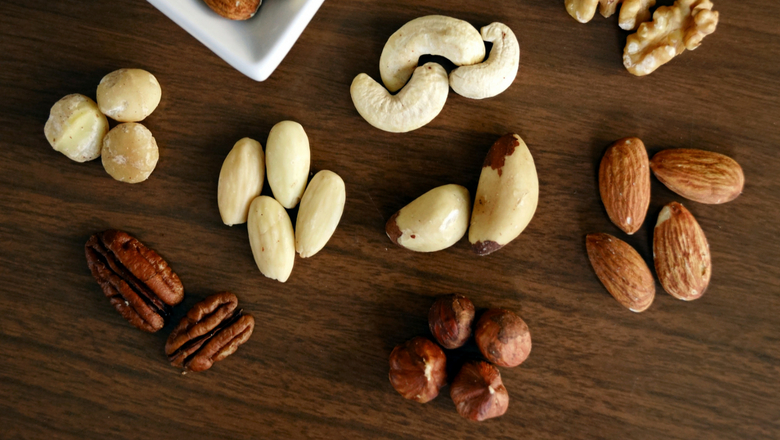Provided by Pathways to Family Wellness magazine, published by ICPA, Inc., Issue #43 written by Kelly Hayford, C.N.C.
Fats, Oils, Nuts, & Seeds
The low-fat fad has made many people fat-phobic. This is unfortunate as fats are highly beneficial to the body—the good fats, that is. The good fats provide essential fatty acids that nourish the brain, lubricate internal tissues and organs, assist digestion and elimination, and take part in hormone production—just to name a few of the many benefits. And contrary to popular belief, the good fats don’t make you fat. So dive in by familiarizing yourself with the following recommended fats, oils, nuts and seeds.
Recommended Oils
Look for oils that are unrefined, cold-pressed, and virgin or extra virgin whenever possible. Heat alters the nature of oils and renders them harmful to the body. Cold pressing oils prevents damage to the essential fats caused by the heat process, thereby, maintaining the beneficial nature of the oil. Virgin and extra-virgin is the highest quality oil, because it’s been extracted from the best produce of the harvest from the first pressing.
Following is a list of recommended oils:
- (butter) or ghee (clarified butter)
- olive oil (extra virgin)
- coconut oil
- sesame seed oil
- hemp oil
- sunflower oil
- (flaxseed oil) – do not heat!
Also contrary to what we’ve been told the last couple of decades, coconut oil is actually good for you. It’s the only oil that maintains its integrity when heated and offers a long list of healthful benefits. It’s also delicious!
In Thailand people consume coconut oil and coconut milk with the same frequency that we drink cow’s milk in the U.S., and yet they have comparatively low rates of obesity, heart disease, and osteoporosis. They’re obviously doing something right and we could take some pointers. For more information, The Coconut Oil Miracle, by Dr. Bruce Fife, is a great read and also explains the politics behind why this highly beneficial oil was falsely vilified.
Your best choice is virgin coconut oil, which has a full-bodied coconut taste. If you don’t like the taste of coconut, try expeller-pressed which is slightly more processed yielding a much milder taste.
The next best all-around oil that’s especially nice for salads and dipping, is extra virgin olive oil. Quality butter (i.e. raw or organic) is also a nice condiment and in addition to coconut oil, is the best choice for baking.
Unrefined sesame oil maintains its integrity at medium temperatures, so it’s a good choice for low-heat stirfrying. When sautéing vegetables or meats unless you’re using coconut oil, keep the temperature below 350°, above that constitutes frying.
Margarine is not recommended for any use as it contains hydrogenated oils (i.e. the bad fats). There are also a few spreads on the market today made from a blend of oils and ingredients. Although these are often thought to be a healthy choice, they’re highly processed and often loaded with additives. Similarly, soy and canola oils are also highly-processed and approximately 90% GMO, so definitely not recommended. Unfortunately, both have made their way into virtually every natural-brand processed food item.
Nuts & Seeds
Avoid roasted, salted nuts and seeds, especially fakefood brands that contain additives such as dyes or MSG. Instead, choose raw, unsalted nuts and seeds in their natural state or “crispy nuts” (see below), as they provide a good source of healthy fats. Limit daily consumption of nuts and seeds to 1-2 handfuls a day. Any more than this can be challenging to digest. If you have known, or suspected problems with your liver or gallbladder, irritable bowl or a generally weakened digestive system, it’s wise not to eat any nuts or seeds until your system is clearer and stronger.
Contrary to popular belief, cashews are beans and peanuts are legumes. Both are common allergens so it’s wise to test for any sensitivity. When it comes to nut butters, buy all natural brands that don’t contain sugar, emulsifiers or other additives. Stir the oil that floats to the top in with the butter with a knife and keep in the fridge. Peanut and almond butter that are freshly ground are your best choices. Of the two, almond butter is better all around because it contains better quality fat and is easier to digest. Tahini, or sesame seed butter, is another good choice.
- almonds & almond butter
- (cashews)
- pecans
- pumpkin seeds
- flax seeds (ground)
- sesame seeds & tahini (sesame seed butter)
- hemp seeds sunflower seeds
- (peanuts & peanut butter)
- walnuts
Tips & Tidbits
- Try chopped hemp seeds on whole-grain toast with butter or hemp oil for a delicious dose of good fats.
- Soak raw almonds in water overnight for easier digestion. Rinse and slide off skins in the morning. Keep refrigerated to preserve freshness.
- To make nuts even easier to digest by removing the phytic acid and enzyme inhibitors, soak overnight in water 2-3”inches above the nuts and 1 tsp sea salt. Drain in the morning, spread on cookie sheets and dry in oven on lowest heat setting for 12-24 hours. Cool and store these “crispy nuts” as they’re called, in the refrigerator.
(Note: Foods in parentheses are either common food allergens or difficult to digest for some people.)
http://icpa4kids.com/fwf/Updated11-4-15%20Nutrition/fwf-oct2015Issue.pdf

